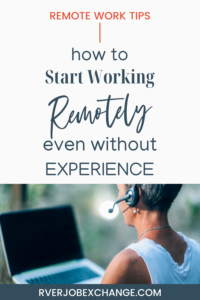How To Start Working Remotely Even If You Don’t Have Any Experience was originally published on www.xscapers.com
The popularity and availability of remote work has been on the rise for the past several years, and it has never been more popular than it is now. With 2020 we’ve seen the spread of Coronavirus, and subsequently, hundreds of thousands of companies expanding and offering remote employment. So how do you start working remotely even if you have no experience? If you have been wondering how to work remotely but worry you lack the experience or skills, keep reading. This article will walk you through how to work remotely, even if you’re a total beginner.
Types of Remote Jobs
While it used to be that the only remote jobs available were for highly skilled individuals, that is no longer the case. There are remote jobs in every industry you can think of! If it can be done from a computer, it can be done remotely. This means:
- Customer Service
- Marketing
- Writing and editing
- Data entry
- Computer Programming
- Administrative
- Bookkeeping/Accounting
- Sales
- Teaching
This list could go on forever. The point here is that you don’t have to have special qualifications or a degree to get a remote job – so many entry level positions exist. And if you do have a degree or certification, that’s great! But it is not a requirement to get started, so don’t get hung up on that.
Decide On Your Ideal Remote Work Situation

The first step on your remote work journey needs to be deciding on your ideal life and work situation. What works for one person may make another miserable. What do you want your life to look like? Are you a morning person? Do you prefer set hours and a set, predictable income? Aside from starting your own business, remote work can be broken down into remote employment or freelancing.
Income Requirements
Before you start your remote work journey, be sure to have a clear picture of your personal financial requirements. Set your budget and decide how much income you need to bring in to sustain your lifestyle. Once you have a clear picture of your income requirements, you will know what to look for (and ask for) in your remote job search.
Remote Employment vs Freelancing
Remote Employment: As a remote employee, you’ll likely be working for a company or business and need to adhere to set hours – like 9-5 or whatever you agree upon with your employer. As an employee, your employer takes care of your tax withholdings and you may also be eligible for certain benefits through your company, like health insurance or 401k. You will earn a salary or hourly wage and have steady paychecks.
Freelancing: As a freelancer, you will be self-employed and take on clients of your choosing. You will be in charge of setting your pay rate, getting new clients, and deciding how often and how long you want to work based on your income requirements. You will also be in charge of handling your own tax withholdings and seeking out your own insurance needs.
9 Skills You Need For Remote Work
These skills are necessary for any remote work situation, whether you decide to be a freelancer or a remote employee.
- Self-Motivation. Are you a self starter? This is an essential skill for remote workers. There will be no physical boss to check in on you, get you started on your tasks, or ensuring you finish your work in a timely manner. You need to be able to motivate yourself to get started on work and stay with it until it’s done.
- Strong Communication Skills. Strong written communication skills are absolutely essential as a remote worker. Whether you’re a freelancer or an employee, you will do a lot of communicating with your clients and/or team via email and online chat communication tools. You will also communicate via phone and video calls, so all-around strong communication skills are a must.
- Comfort Learning and Using Digital Tools and Softwares. When you work remotely and collaborate with clients or a team, there will come a time when you have to use certain digital tools or softwares. Examples of these may include cloud-sharing apps like Google Drive and Dropbox, project management software like Monday or Airtable, and so on. It is not necessary to know all of these tools up-front, but you must be comfortable to learn and use them as necessary. Adaptability and a willingness to learn will take you a long way.
- Collaboration. Are you a team player? The ability to collaborate with a team is an important skill for remote workers, even as a freelancer. You may work on team projects, need to collaborate with a client to finish a task, etc.
- Reliable Equipment. You need to possess the tools for the job, and they must be reliable. Examples of this would be:
- A reliable computer with enough storage and speed to handle your workload
- A strong internet connection – don’t rely solely on campground wifi, many times it isn’t reliable
- Good cell signal for phone calls (and internet if you use it for data, this may require a cell signal booster)
- A webcam for video meetings – many laptops have pre-installed webcams
- A microphone for better audio during meetings – nothing is worse than bad audio! Some earbuds have microphones in them, and this can work at minimum
- A backup internet option – many RVers have several backup options, and if all else fails, head to the local library or coffee shop
- Responsiveness. This is pretty self-explanatory. You need to keep lines of communication open and be responsive to your clients and/or employer during agreed upon work hours.
- Organization. You don’t have to be the most organized person in the world, but you need to be able to keep up with communication, project tasks, digital files, etc.
- Time Management. This skill can be tied into self-motivation. As a remote worker, time-management skills are so, so important! Even if you don’t have strict deadlines on your projects, you need to be able to complete them in a timely manner. If not for your employer, for yourself. It can be easy to procrastinate and stretch out a 3 hour task over the entire day… or longer.
- Balance. Be sure to have hobbies and interests outside of your work to create a healthy work/life balance. When you don’t have a healthy balance, you risk burning out. This will lower your productivity levels and affect every area of your life. Just because your work is always there doesn’t mean you should always be working!
How To Repurpose Your Existing Skills for a Remote Work Resume and Environment
The above skills are essential for remote workers. So how do you identify those skills in yourself from your past work experience, AND convey them to potential employers?
There are two categories of skills: soft skills and hard skills. The most valuable remote work skills, like the ones listed above, are soft skills. Soft skills refer to how you work, hard skills refer to what it is that you do. Effective communication is a soft skill, proficiency working in Google Drive is a hard skill.
Identifying Your Remote Work Skills

If you’ve never worked a remote job before, it’s easy to assume that you don’t have the experience necessary to land one. However, that’s not true! Not all remote employers are looking for candidates with remote experience. But, they will be looking for certain soft skills that show them you can effectively work from home.
To identify your remote work skills, start with making a list of previous work experience. This list should contain every job you’ve ever had, no matter how insignificant it may seem. Not all of this list will go on your resume, only the most relevant parts. If you’ve ever had side jobs, done any volunteering in your community, held events, wrote a blog, include those in your preliminary list.
From this list, determine what skills you had to have to perform essential tasks that you could relate to a remote work environment.
For example, as a bartender or server, your skills might look like:
- Effective communication
- Ability to work well on a team
- Flexibility and Adaptability
- Strong interpersonal and customer service skills
- Ability to maintain a high level of professionalism in a challenging environment
If you’ve ever had a hobby blog, your skills would include writing, proficiency using computers, etc. Or, if you’ve ever been a volunteer admin for a Facebook group, your skills could include community management. Get really creative here! Even parenting skills can translate into remote work skills.
Conveying Remote Work Skills on Your Resume
Now that you know what you can bring to the table in a remote work situation, you need to be able to convey those skills on a resume for remote employers.
Include any relevant job or hobby experience, and list the relevant skills and tasks you performed for the job that could relate to a particular job or remote work situation in general.
Be sure to list any tools and softwares you’re already familiar with, too.
How To Find And Apply To Remote Work Jobs
Now that you know your skills and have revised your resume for a remote job search, where do you go to find remote jobs?
- You can search the main job boards like Monster, Indeed, CareerBuilder, etc, for keywords like “remote” and “telecommute”
- Create or refresh your LinkedIn profile and search for remote and telecommute jobs on LinkedIn
- Network on social media and let friends and acquaintances know what you’re looking for
- Websites like FlexJobs, WeWorkRemotely, Virtual Vocations, and more
- You’ll even see remote jobs posted to The RVer Job Exchange.
As a freelancer you can use these techniques, as well as finding potential clients you want to work with and reaching out to them directly, whether or not you see a job listed.
Setting Yourself Up For Success As A Remote Worker

Working remotely is a lot different than working in an office, and as such, there are certain things you can do to set yourself up for success in your work and for your health.
- Set up a dedicated workspace. Whether you’re working from home or your RV, having a dedicated workspace can help you be more productive and is also better for your physical health. If you’re spending long hours at the computer, make sure your workspace is ergonomically correct to ease the strain on your body.
- Create and stick to a schedule. Whether you have set work hours or not, giving yourself certain time periods to complete tasks will help you stay productive and on top of your time management. This will help with your work/life balance and help you meet deadlines.
- Get dressed and ready for the day. As a remote worker it is all too easy to wear pajamas all the time. Getting yourself dressed and ready each day promotes a feeling of alertness and can increase your productivity.
- Maintain a healthy work/life balance. If you plan to be RVing, make sure you give yourself full days off to go explore and enjoy the lifestyle. If you’re working from home, give yourself full days off and engage in hobbies or other activities to keep your mind off of work.
Remote work is the future, and it’s more attainable now than it ever has been before. By now you should be aware that you, in fact, DO have the skills necessary to be a remote worker… even if you’ve never done it before.
To connect with remote working full-time RVers, join the Xscapers Facebook Group here.
For remote work inspiration and advice from full-time RVing remote workers, check out this interview series!


Author
Carrie Fay
Carrie has been on and off the road for the past 3 years, experiencing travel as a full-time RVer and most recently trying out the van life.
When she’s not geeking out on marketing or befriending the local cats, you can find Carrie at her website: Making Money and Traveling – where her love of travel and obsession with location-independence meet.



